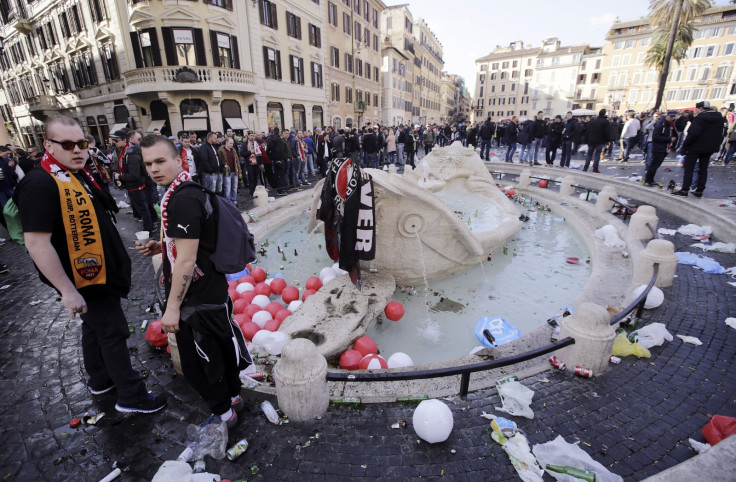Rome: Dutch Feyenoord fans permanently damage newly-restored Barcaccia fountain in rampage

Rome's world-renowned 17-century Barcaccia (Sunken boat) fountain at the foot of the Spanish Steps has been permanently damaged by Dutch Feyenoord football supporters after clashes with police broke out before the Europa League match with Roma on Thursday (19 February).
The Baroque fountain, which was completed in 1627 by Italian artists Pietro and Gian Lorenzo Bernini, had just been restored as part of one-year €200,000 (£150,000, $231,000) project. Technicians assessed that Feyenoord fans scratched and chipped the travertine stone-made fountain on "110 different points", causing permanent damage and then filling it with scores of empty beer bottles.
"The fountain will return as it was before," Annamaria Cerioni, a local technician said.
Shame @Feyenoord @Feyenoord_int ! #barcaccia pic.twitter.com/TVTHKUmUJA
— Luca De Santis (@lucadex) February 20, 2015Rome cultural heritage councillor Claudio Parisi Presicce told ANSA news agency: "We already verified the presence of some chipping yesterday, in particular a 10cm piece of travertine on the lip of the basin's central 'candelabrum'... but now we have found that the impact of these bottles caused much greater damage than were visible to the naked eye last night."
Shaped as a half-sunken ship with overflowing water, the Barcaccia was defaced by drunk Dutch football supporters who turned the historical centre of Rome into a war zone. Twenty three people were arrested and 19 charged for resisting arrest after hours of clashes with police, with Feyenoord supporters throwing bottles at riot police who responded with teargas.
A member of the city government, Livio Ricciardelli, called on Feyenoord to make a public apology and pay for the damage caused.
Rome mayor Ignazio Marino condemned the act and said the Dutch government has refused to pay for the damages.
"I have spoken to the Dutch ambassador and I asked him - do you intend to pay for the damages?" Marino said. "He said that he did not think that the Dutch government could pay for the new restoration of the Barcaccia."
However, the Dutch embassy in Rome said that there was "no place for violence in football" and offered to collaborate.
Eric Gudde, general director of Feyenoord, said he felt "disgust and shame" after the incident.
© Copyright IBTimes 2025. All rights reserved.






















